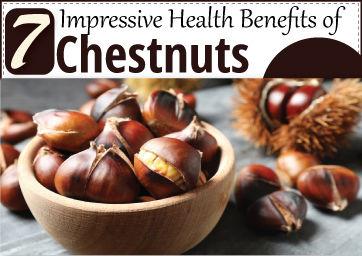Chestnuts Health Benefits
Chestnuts remain a good source of antioxidants, even after cooking. They’re rich in gallic acid and ellagic acid—two antioxidants that increase in concentration when cooked. Antioxidants and minerals like magnesium and potassium help reduce your risk of cardiovascular issues, such as heart disease or stroke.
1. Prevent Diabetes
Many people are unaware of the significant role that dietary fibre can play in the regulation, prevention, and management of diabetes. Foods that are high in dietary fibre, like chestnuts, are chestnuts good for diabetics, which means that they cause blood sugar to rise slowly as compared to high glycemic foods. This helps prevent the spikes and drops in blood sugar that can be dangerous for diabetic patients, and are often precursors to the development of diabetes in those currently unaffected.
Read Also: Food to Avoid in Diabetes
2. Boost Immune System
The high concentration of vitamin C and other antioxidant compounds in chestnuts make them an ideal boost to your immune system. Vitamin C not only stimulates the production of white blood cells but also acts as an antioxidant, seeking out free radicals within the body and neutralizing them before they cause healthy cells to mutate or induce oxidative stress near vital organs. This can help the immune system focus its efforts on pathogens and preventing illnesses.
3. Increase Bone Mineral Density
Copper and magnesium aren’t the first things that one thinks of when it comes to bone health, but copper is extremely important in the process by which the body absorbs iron, which is also crucial for bone growth and development. According to doctor Jacob Selechnik, magnesium is very good for increasing bone mineral density and provides a wide variety of other health benefits.
Read Also: Health Benefits Of Water Chestnuts
4. Relieve Digestive Issues
Chestnuts have one of the highest content of dietary fibre in the world of “nuts”, which means that they are powerful allies in any gastrointestinal struggle. Dietary fibre helps stimulate peristaltic motion in the intestines, thus regulating your bowel movements and preventing inflammation and discomfort. Dietary fibre can also help optimize the absorption of nutrients, which means getting more out of the food you eat and a better overall nutrient profile.
5. Improve Brain Function
Brain function and cognition are improved in a number of ways through the consumption of chestnuts. First of all, these nuts are rich in the B family vitamins (e.g., folate, riboflavin, thiamine) which are directly linked to proper neurological development and function. Furthermore, the potassium found in chestnuts can increase blood flow to the brain and promote good nervous system health, thus increasing concentration, retention, and memory.
Read Also: 7 Health Benefits Of Yellow Bell Pepper
6. Prevent Chronic Illnesses
Chronic illnesses of all kinds are caused by the release of free radicals, the natural byproducts of cellular respiration. These can cause healthy cells to mutate, resulting in cancer, oxidative stress and several chronic illnesses. Without antioxidants, like those found in chestnuts, our body would be fighting battles on many fronts, so increasing your defences with a handful of chestnuts a day is a good idea.
7. Control Blood Pressure
When it comes to lowering blood pressure, few minerals are as essential as potassium. Potassium controls water movement within the body, and also functions as a vasodilator, increasing blood flow and releasing the tension on constricted blood vessels and arteries. This reduction in blood pressure can boost overall cardiovascular health and lessen your risk of heart attacks and strokes.
Read Also: Why Do Men Need To Have Regular Full Body Checkup
Conclusion
Chestnuts are tasty, nutritious and popular snacks that come with numerous benefits. Also, they're a good source of fibre, vitamin C, copper, vitamin B and antioxidants that give various health benefits. It's very easy to add chestnuts to everyday meals like salads, soups, stuffing and desserts and turn an ordinary meal into a healthy and tasty one. We hope this guide helps you find out the impressive benefits of chestnuts.
FAQs
Q. What are chestnuts good for?
Chestnuts are packed with fibre, vitamin C, B vitamins, copper, manganese, and a chestnut good for diabetes, which improves overall health and even has cancer-fighting properties.
Q. How many chestnuts can I eat in a day?
Around ten chestnuts is a good daily amount to get their benefits.
Q. Do chestnuts have omega-3 fats?
Chestnuts only contain small traces of omega-3 fats, so they're not a strong source.
Q. Are chestnuts good for hair health?
Chestnuts benefits for hair health and contain vitamins B, zinc and antioxidants, which help nourish the scalp and strengthen hair.
Q. Is chestnuts better than almonds?
Chestnuts are lower in calories and fat but high in carbs. On the other hand, almonds are richer in healthy fats, protein and vitamin E, which is good for heart and skin health.
Q. Can I eat chestnuts without cooking them?
Yes, you can eat chestnuts raw, but they can be hard to digest and taste bitter.



 Contact Us
Contact Us






 Hospitals
Hospitals
 Doctors
Doctors
 Diagnostic
Diagnostic
 Pharmacy
Pharmacy
 Health Tips
Health Tips
 Blog
Blog

















Comments